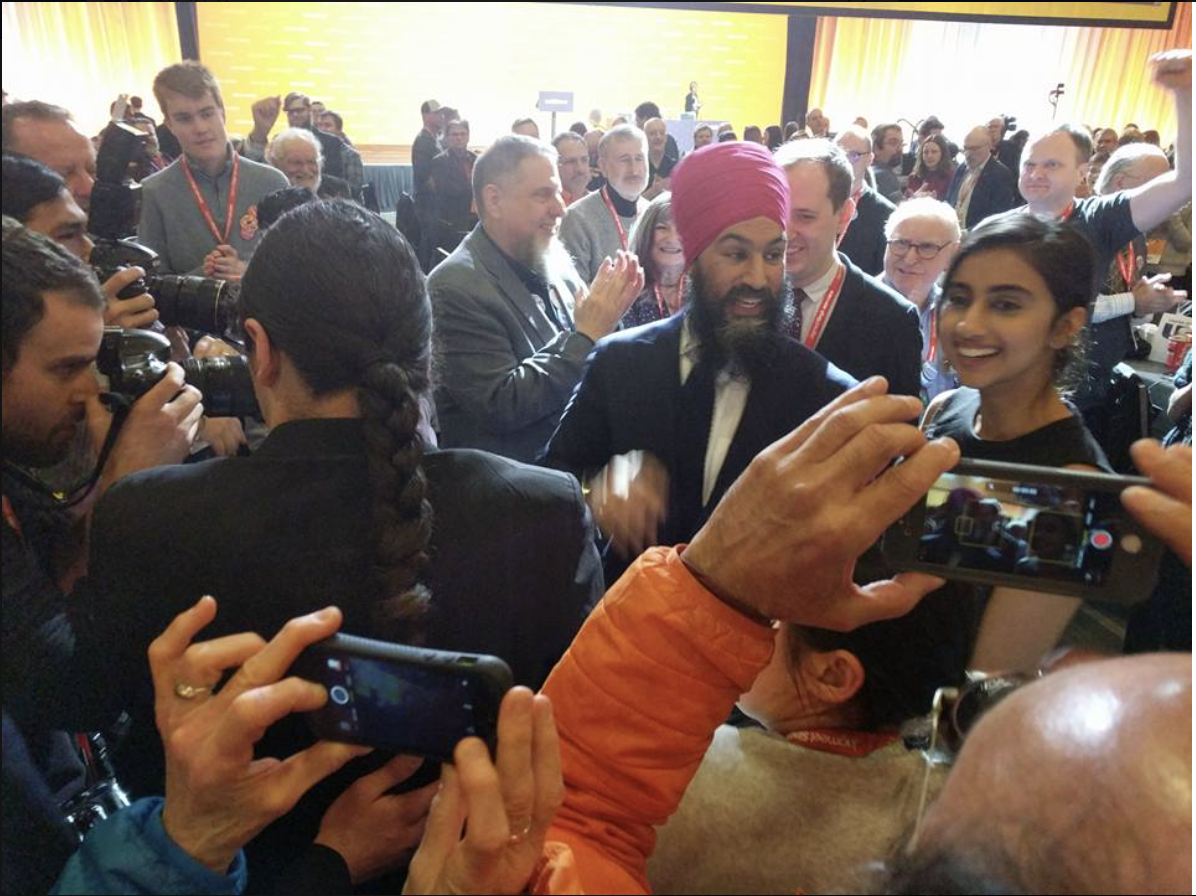Delegates listened to NDP leader Jagmeet Singh’s speech at the party’s biannual convention on Saturday and felt inspired in a way they haven’t in a long time. They interrupted the still-new leader frequently with standing ovations. At one point, Singh interrupted himself to reach for a glass of water and some even applauded that.
“You know you’re doing well when they even cheer you drinking water,” he joked.
When he had finished, many commented that it was not only a good speech; it was the best leader’s speech to a convention that they had ever heard.
The speech was positive and cheerful, as Singh always is. He seems incapable of negativity and anger. Before the alt-right hijacked the term, we might have described it as populist.
From the outset, the speech spoke directly to people’s frustrations and discontents. Singh noted that despite the notional economic boom we’re experiencing, people are not feeling it. He talked about Canadians living pay check to pay check, and about their high and unsustainable level of personal debt.
He then pointedly addressed the Donald Trumps and Doug Fords, the right-wing populists, who, Singh said, seize on a widespread sense of economic insecurity to “benefit themselves and their wealthy friends,” by making government and taxes out to be the enemy, not part of the solution.
The case of the Sears employees and pensioners
Unlike Tom Mulcair and even to a great extent Jack Layton, Singh did not go to pains to sound moderate, reasonable and mainstream. He never, for instance, mentioned the great and holy middle class. Instead he referred repeatedly to inequality and the concentration of wealth.
“People,” he said, “must be able to earn a living. Too many jobs are precarious.” As a case in point he cited Sears employees and retirees who “gave their whole life” to the company and ended up watching bondholders get their money and executives get bonuses while they were left out in the cold.
As Singh sees it, Prime Minister Justin Trudeau’s message to the victims of the Sears bankruptcy is: “Get used to it.” By contrast, the NDP leader’s message to a cheering crowd was: “We’re not getting used to it. We’re going to pass laws against those practices.”
The NDP leader also devoted a fair amount of time pushing back against the Trudeau government’s infrastructure bank, which he characterized as a plan to privatize public goods. Those goods “are ours,” he said, and should never be turned into vehicles for profit.
It was heady stuff and signalled that the NDP plans to put its focus where the Liberals have disappointed many voters who supported them in 2015.
However, when you take a closer look at the programmatic proposals in Singh’s speech you don’t see much that is very radical or innovative.
The NDP pledges to deliver national pharmacare, a long-time commitment, but seems to have decided to downplay, or has totally forgotten about, last time’s signature pledge of a national child care program. Instead, the party now promises, in addition to a prescription drug program, universal dental care. In making that pledge, Singh asked: “Why does our health system cover some parts of the body but not others?”
The party will also deliver electoral reform, a big Liberal broken promise, although, for some strange reason, Singh has boxed himself in by promising not only reform, but, specifically, proportional representation (PR).
No advocates for reform in Canada have ever suggested pure PR. What most want is an element of PR in a hybrid system. It could be a single transferable ballot, which combines PR with Justin Trudeau’s favourite, the ranked ballot. Or it could be a mixed member PR system, with both first-past-the-post MPs and proportionately elected ones, by region or province.
When he makes PR the centrepiece of NDP reform policy Singh shifts the focus away from the urgent need for a more responsive and representative democracy to a singular focus on one potential element of a larger solution.
Will filling in Trudeau’s missing blanks suffice?
By contrast, on other matters such as climate change, the NDP leader seemed almost deliberately non-specific. On global warming he promised only to do better than the Liberals, without telling us what he would do. The word pipeline did not pass his lips.
Similarly, the NDP leader evoked the situation of Indigenous Canadians, anti-Black racism, equal pay for equal work, universal internet connectivity and the need to make the wealthiest pay their fair share without enunciating any specific policy proposals.
The speech represents more of a shift in tone and rhetoric for New Democrats than a lurch leftward in political ideology. Still, at this convention the NDP made a start at carving out its new place on the political landscape.
When Singh talked about electoral reform, ending pension theft, keeping infrastructure public, and expanding universal healthcare he emphasized areas where the Trudeau Liberals have come up short.
But will filling in Trudeau’s blanks be enough of a strategy for the next election? NDPers still have time to consider that question.
Photo: Michelle Langlois
Like this article? Please chip in to keep stories like these coming.




